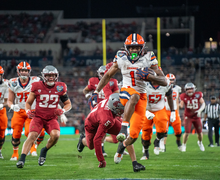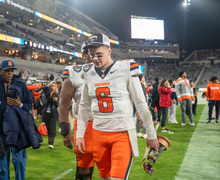Football student managers balance academics, working for team
Spencer Bodian | Staff Photographer
Jake Warren, a student manager on the football team, takes part in pre-game warmups. The managers can work for up to 14 hours on a game day and are assigned to aid a specific position group, such as running backs or quarterbacks. spencer bodian staff photographer
Ten Syracuse University students attend football practices four days a week.
They’re at the Carrier Dome hours before kickoff on the weekends, they travel to road games and they’re on the sidelines on gameday.
But they’re not on the team.
“It’s almost like being a Division I athlete, except we’re not playing,” said Zach Thebner, a sophomore public relations major and student manager for the SU football team.
Each of the 10 student managers face a demanding schedule every week, beginning in August with training camp and sometimes lasting into winter break. In addition to juggling classes and the demands of being a college student, student managers assist in prepping the practice fields during the week and assisting with equipment and other tasks on game days.
Steve Fantigrossi, a senior political science major, is the head student manager for the team. Fantigrossi said he and the other managers arrive at Manley Field House around 2 p.m. on weekdays to set up the equipment the coaches need for practice. Each manager is responsible for assisting the coaches of a particular position group such as linebackers, quarterbacks or running backs.
Practices finish around 6:30 p.m. After that the managers get dinner, and a few of them stay to wash the team’s equipment, said Dan Connolly, a junior finance major and second-year manager.
“We’re the first ones on the field and the last ones off,” Connolly said.
But when gameday rolls around it’s a much different process. Fantigrossi said managers arrive at least five hours early for the game to make sure everything is ready to go.
That means preparing uniforms and pads for the game, redoing helmet stickers, cleaning visors and setting up the field with coaches’ headsets and other equipment, said Jakob Bocianski, a junior sport management major in his second year as a manager.
Once the game begins, each manager has a different role. A couple managers make sure the officials have a fresh ball when necessary during the game, one tracks plays and others assist with the personnel on offense and defense.
“Of course the game is what we work for all week,” Fantigrossi said. “So it’s incredible to get a front row seat on the sideline and even play a role in the game depending on what job you’re doing that particular day.”
But when the game ends, the managers’ jobs don’t.
“Most people will go after the game to hang out with friends but we still have work to do,” Thebner said.
Thebner said the managers work as long as 12, 13 or 14 hours on game days. After the game, they move everything off the field, bring the equipment back to Manley Field House and put all the players’ equipment back in their lockers.
Since the managers are constantly working to help the team during the week, it can be difficult to balance their responsibilities on the field with their schoolwork.
Connolly said balancing the job with other responsibilities is all about time management. If certain managers have exams or other assignments, the group will work out who stays later to accommodate schedules. Despite the constant commitment during the season, which can stretch from August to December if the team makes a bowl game, Connolly said he loves every second of it.
Many of the managers find time for activities outside of the classroom and away from the field as well. Connolly is in Delta Sigma Pi, a business fraternity on campus. Thebner is a member of Syracuse Cru and Fantigrossi is a student representative on the University Senate.
“It’s not so much that we don’t have the time, it’s about finding the time and motivation to get work done even after an exhausting day of classes and practice,” Fantigrossi said.
The challenge of balancing schoolwork with the duties of the job is something shared by all of the student managers. With all of the time they spend together, the group has developed strong friendships with one another.
It’s also led to relationships with coaches and players on the team. Fantigrossi said the coaches know all of the managers’ names, and head coach Scott Shafer introduced them all to the team at the start of the year.
The players are also friendly with the managing crew. While some of them don’t know how much work goes into the job, Connolly said once the players see the time the managers put in, they’re usually surprised and appreciative.
Regardless of how well the players and coaches are doing on the field, Fantigrossi said the managers are always focused and working as hard as they can.
Said Fantigrossi: “Whether the team is undefeated or hasn’t won a game, that’s what we strive for — being the best manager crew in the nation.”
Published on October 16, 2014 at 12:26 am
Contact Brett: blsamuel@syr.edu | @Brett_Samuels27





